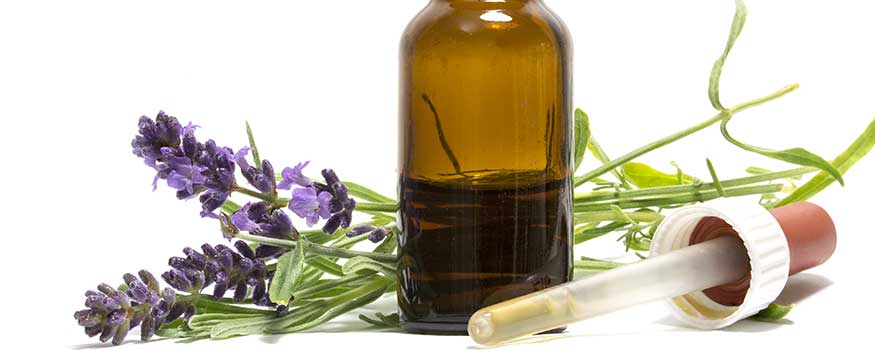We all experience a certain amount of stress and anxiety, and in small doses it may even enhance school or job performance. But chronic stress and anxiety can put you at risk for stress-related illnesses and threaten work-life balance. One byproduct of stress and anxiety is inadequate sleep and sometimes insomnia. If you have insomnia, you may have difficulty falling asleep or staying asleep, wake up too early, experience low energy and difficulty concentrating, and suffer from irritability. This in turn may lead to problems in relationships with family, friends, and coworkers. To deal with the triad of chronic stress, anxiety, and insomnia, we sometimes turn to over-the-counter or prescription drugs, which may lead to abuse.
An alternative to pharmacological treatment is aromatherapy, an integrative therapy that includes smelling pleasant oils or massaging them into the skin. Lavender essential oil, for example, helps decrease anxiety and improve sleep with few to no adverse reactions. Lavender can be administered through the skin (massage or dermal patch), inhaled (by electronic diffuser, aromatherapy inhaler, or cotton balls infused with oil), and orally (pill or tea). In the United States, cutaneous and inhaled lavender aromatherapy are most common. An orally administered formulation has been clinically tested and is prescribed for generalized anxiety syndrome in Europe. Since 2009, it’s been licensed in Germany to treat sub-syndromal anxiety and tension.
Lavender in action
Lavender essential oil is produced by steam-distillation of the flowering heads and leaves of the plant. Linalyl acetate and linalool are the two key active constituents.
The true mode of action of fragrance aromatherapy remains speculative; effects have been attributed to physiologic (with the site of action in the amygdala) and psychologic (associations to an aroma) responses. Animal studies report a possible sedative effect as linalool acts on gamma amino butyric acid (GABA) receptors, inhibiting binding of GABA and the presynaptic calcium channels and exerting a depressant effect on neurotransmission. In laboratory studies using mice, minute doses of lavender oil worked similarly to pregabalin, inhibiting voltage-dependent calcium channels in the hippocampus, a region of the brain that’s significant for anxiety disorders. Depending on the reason for using lavender, it may have both hypnotic and anxiolytic effects.
Lavender to reduce anxiety and improve sleep
Have you returned to school for your bachelors in nursing or a graduate degree? Perhaps you’re feeling test anxiety or losing sleep as you try to juggle work, life, and assignments. Performance or test anxiety can be incapacitating to any student, but nursing students have higher levels of debilitating anxiety than the general student population. Several nurse educators found that using lavender inhalers before and during highstakes testing significantly reduced test anxiety for students. Studies using only lavender essential oil, rather than a mix of oils, demonstrated that lavender acted as an effective anxiolytic in reducing the stress of test taking. In the oral form, lavender has established benefits in controlling anxiety as effectively as paroxetine or lorazepam. Several other studies showed that lavender also appears to help with sleep, without the adverse effects of commonly used drugs.
In our research on lavender, test anxiety, and sleep, freshman student nurses used essential oil lavender-infused nasal inhalers. As the frequency of their lavender inhalation use decreased, their quality of sleep also decreased, leading us to conclude that lavender inhalation may improve sleep quality. (See Lavender, nursing students, and anxiety.)
Lavender application
Lavender is generally safe, with few serious adverse effects. However, note that some workplaces prohibit the use of any fragrance that might trigger a respiratory response. (See Common adverse effects of lavender.)
When using lavender, remember that fragrance preference is subjective and may be rooted in our psychological responses rather than pharmacological effects. Many species of lavender plants exist, so you may prefer different manufacturers’ or distillers’ products.
• Use pure, high-grade oils from reputable manufacturers. In our research, we asked massage and holistic therapist colleagues for their recommendations.
• To preserve the chemical composition of the oil, store it in glass bottles with tightly closed caps, in a dark, cool place.
• Sew lavender-infused eye masks or sachets to use at bedtime.
• Buy an electronic air diffuser for your bedroom. Usually, one drop of lavender essential oil will infuse a large room, and the scent lasts several days.
• Put an oil-infused cotton ball on your night table, about 16 inches from your nose, or under your pillow.
• Infuse a personal nasal inhaler or nonmedicated transdermal patch with lavender oil. We used just four drops of essential oil in our inhalers, and the scent remained pleasantly strong for 4 months. However, direct nasal inhalation is an intense route of delivery.
• Essential oils are flammable, so keep them away from direct flames and keep your room well ventilated.
• Visit the National Association for Holistic Aromatherapy website for more information about aromatherapy and essential oils.
Take care of yourself first
As a nurse, you work under high levels of stress and anxiety, whether on the job or in school. Aromatherapy with lavender essential oils provides a nonpharmacological method for relieving stress and insomnia. When you take care of yourself, you’re better able to care for your patients.
Martha J. Greenberg is an associate professor and program director of the RN/BS Completion Program at Pace University in Pleasantville, New York. Anesha Narain is a clinical nurse on a neurosurgery stepdown unit at New York-Presbyterian Columbia University Medical Center in New York.
Selected references
Lee YL, Wu Y, Tsang HW, et al. A systematic review on the anxiolytic effects of aromatherapy in people with anxiety symptoms. J Altern Complement Med. 2011;17(2):101-8.
Lewith GT, Godfrey AD, Prescott P. A single-blinded, randomized pilot study evaluating the aroma of lavandula augostifolia as a treatment for mild insomnia. J Altern Complement Med. 2005;11(4):631-7.
Lillehei AS, Halcon LL. A systematic review of the effect of inhaled essential oils on sleep. J Altern Complement Med. 2014;20(6):441-51.
McCaffrey R, Thomas DJ, Kinzelman AO. The effects of lavender and rosemary essential oils on test-taking anxiety among graduate nursing students. Holist Nurs Pract. 2009;23(2):88-93.


















